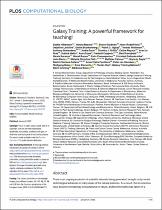| dc.description.abstract | There is an ongoing explosion of scientific datasets being generated, brought on by recent technological advances in many areas of the natural sciences. As a result, the life sciences have become increasingly computational in nature, and bioinformatics has taken on a central role in research studies. However, basic computational skills, data analysis, and stewardship are still rarely taught in life science educational programs, resulting in a skills gap in many of the researchers tasked with analysing these big datasets. In order to address this skills gap and empower researchers to perform their own data analyses, the Galaxy Training Network (GTN) has previously developed the Galaxy Training Platform (https://training.galaxyproject.org), an open access, community-driven framework for the collection of FAIR (Findable, Accessible, Interoperable, Reusable) training materials for data analysis utilizing the user-friendly Galaxy framework as its primary data analysis platform. | en_US |

